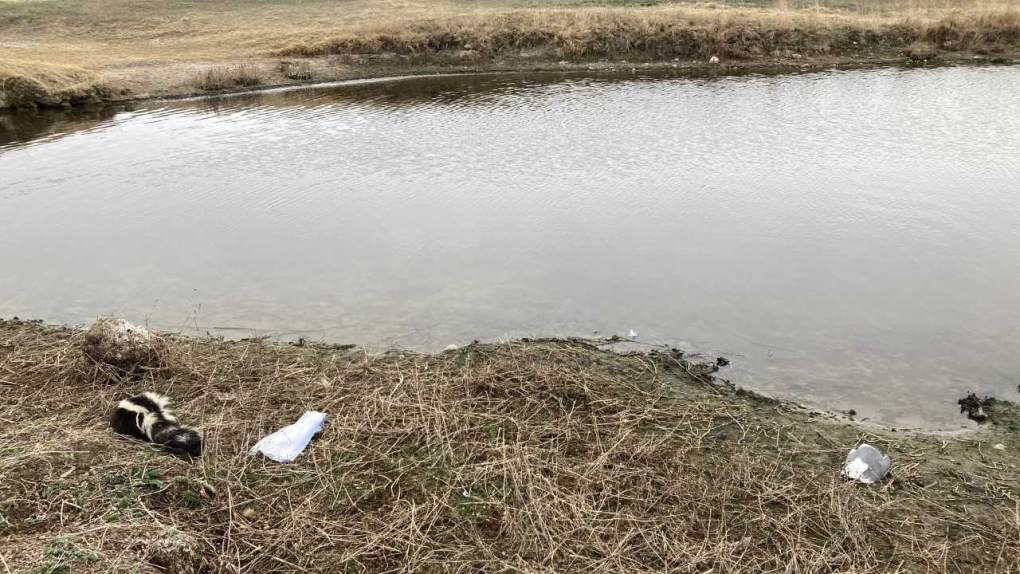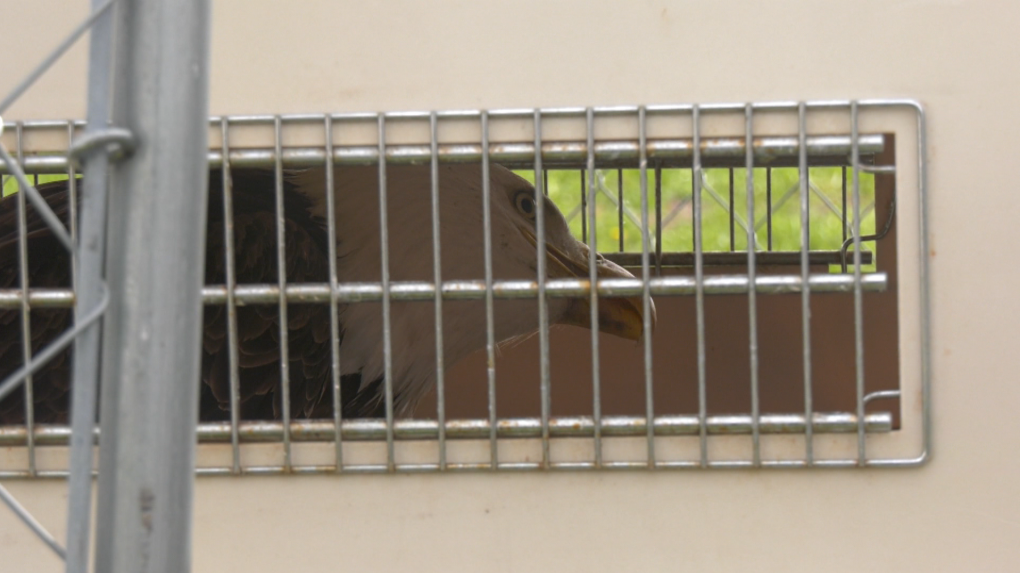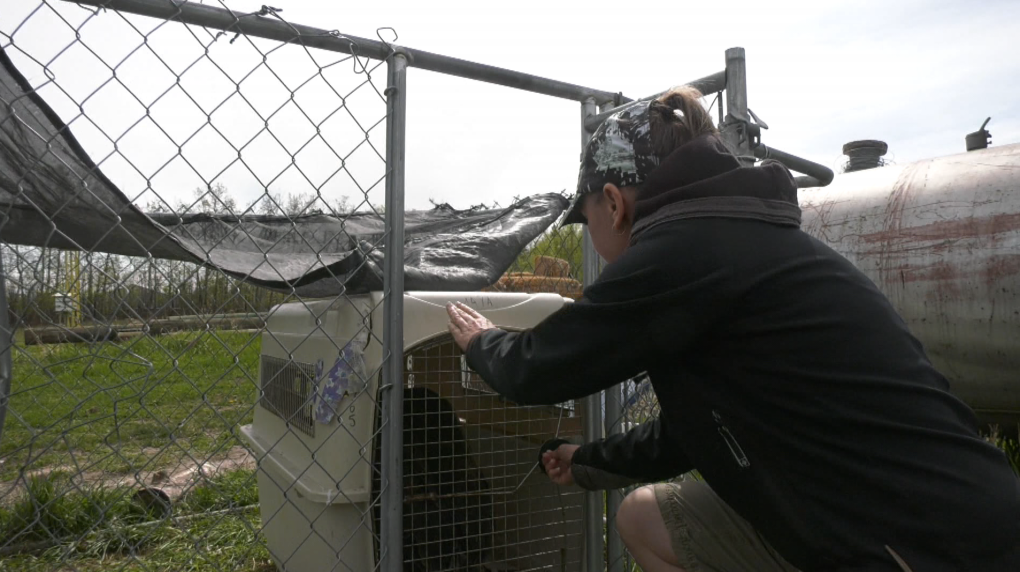Bird flu found in Alberta skunks for first time: experts
Alberta is the latest Canadian province to have found avian influenza, or bird flu, in another species.
Cases of bird flu have been confirmed in skunks in the Vegreville-Wainwright-Lloydminster area in east-central Alberta, according to the province's wildlife disease specialist.
"[Avian influenza] was brought into the province in early April in migrating waterfowl, primarily the geese. As a number of geese died, we started getting reports about a number of dead skunks," Dr. Margo Pybus told CTV News Edmonton.
The skunks tested negative for rabies and positive for bird flu.
They are the only other species so far that Alberta has confirmed had avian influenza, although lab tests are pending for some young foxes, as well.
Ontario, Manitoba and Saskatchewan have all confirmed avian flu cases in foxes, according to Pybus' sources.
 Dead skunks found in east-central Alberta tested positive for avian influenza. (Source: Dr. Margo Pybus).
Dead skunks found in east-central Alberta tested positive for avian influenza. (Source: Dr. Margo Pybus).
She called the recent virus strain – which first showed up in Atlantic Canada in late 2021 – "hotter than usual."
"This is the first time we've seen mortality in wild birds, and it's also the first time we've seen mortality in mammals that are eating the wild birds."
HEAD TILT, SPINNING ARE OBVIOUS SIGNS
Some affected wild birds have turned up at the Strathcona Raptor Shelter, which is run by the Alberta Society for Injured Birds of Prey east of Edmonton.
Roseanna Gullekson, assistant director of the shelter, said it had never been brought a bird flu case before this year.
But since mid-April, the shelter has received seven birds which all displayed the same disconcerting signs of avian influenza: balance issues, spinning, and – the "dead giveaway" – a tilted head.
"The tricky thing is we can't test them until they're dead to confirm whether or not it's bird flu," Gullekson said.
"Anything that comes in with [central nervous system] issues comes in with a story. The red tail hawk that came in first was hit by two cars. So, right off the bat, you know, maybe that's what's causing the head tilt or the balance issues – concussion, right? It's not strange for that. But the spinning in circles is."
On Wednesday, she was caring for a mature bald eagle that was believed to be sick with bird flu. A vet found no signs of trauma. However, its head was almost constantly swivelled, sometimes completely upside down.

There is little recourse if it does have bird flu, so the shelter is keeping him in an animal crate with the hope that the forced rest enables him to recover.
"It's hard to know whether it feels safe, you know," Gullekson said before shrugging. "No predators are going to eat him, free food, breakfast in bed, basically. It could be worse."
The eagle, unlike all of the other probable avian influenza cases the shelter has taken in, had been showing signs of improvement. The mortality rate for avian influenza in raptors is 95 per cent.
"It's pretty bad," Gullekson said.
OUTBREAK BELIEVED TO BE ON DECLINE
Since April 3, Alberta has found 86 probable cases of avian influenza. Most cases have been found in Canadian geese, red-tailed hawks, and great horned owls.
The most severe kind of avian influenza can only be confirmed by the national lab. As of Thursday, the Canadian Food Inspection Agency was tracking 28 "infected premises" in Alberta where either commercial or small flocks (both poultry and other kinds of birds) were sick with highly pathogenic avian influenza (HPAI).
While some strains have the potential to be passed to humans, the Alberta government says there is very low risk to human health and food safety.
Alberta's outbreak is also believed to be on the decline.
"In other places that have already had their outbreaks, when the geese moved off, then the avian influenza seemed to disappear," Pybus told CTV News Edmonton. "Certainly the numbers of dead birds and dead skunks in Alberta has tailed off a little bit in just the last seven to 10 days, so we're thinking that it is on the downward side."
But, she noted, since this is a new version of avian influenza, it's not known what will happen in the fall, when outbreaks are atypical.
"Mother Nature's going to tell us what's going to happen."

While there is low risk to humans, anyone who is handling a dead bird is advised to wear gloves, if handling the animal is unavoidable.
Both Pybus and Gullekson said cleaning up infected carcasses to prevent other animals from eating them is the best course of action.
Agriculture producers are advised to be aware of the early clinical signs, and prevent contact between wild animals and domestic flocks.
More information is available online:
CTVNews.ca Top Stories

BREAKING Former Air Canada employees among suspects identified in gold heist at Pearson Airport: police
Nine people have been arrested in connection with the gold heist at Pearson International Airport last year, Peel Regional Police said Wednesday.
MPs summon ArriveCan contractor to the House to be admonished in rare parliamentary display
Enacting an extraordinarily rarely used parliamentary power, MPs have summoned an ArriveCan contractor to appear before the House of Commons on Wednesday afternoon to be admonished publicly for failing to answer their questions.
'Enormous sum of money': Actor Hugh Grant settles privacy lawsuit against tabloid
British actor Hugh Grant has settled a lawsuit against the publisher of Rupert Murdoch's tabloid newspaper, The Sun, over claims journalists used private investigators to tap his phone and burgle his house, he said on Wednesday.
Gas prices across Ontario expected to climb to levels not seen since 2022, analyst says
Ontario is going to see a big jump at the pumps later this week as gas prices in the province hit levels not seen in nearly two years, according to one industry analyst.
Ancient skeletons unearthed in France reveal Mafia-style killings
More than 5,500 years ago, two women were tied up and probably buried alive in a ritual sacrifice, using a form of torture associated today with the Italian Mafia, according to an analysis of skeletons discovered at an archaeological site in southwest France.
O.J. Simpson was chilling with a beer on a couch before Easter, lawyer says. 2 weeks later he was dead
O.J. Simpson's last robust discussion with his longtime lawyer was just before Easter, at the country club home Simpson leased southwest of the Las Vegas Strip. About a week later, on April 5, a doctor said Simpson was 'transitioning.'
Some of the winners and losers in the 2024 federal budget
With a variety of fiscal and policy measures announced in the federal budget, winners include small businesses and fintech companies while losers include the tobacco industry and Canadian pension funds.
U.K. plan to phase out smoking for good passes first hurdle
The British government's plan for a landmark smoking ban that aims to stop young people from ever smoking cleared its first hurdle in Parliament on Tuesday despite vocal opposition from within Prime Minister Rishi Sunak's Conservative Party.
Father of boy accused of stabbing 2 Australian clerics saw no signs of extremism, Muslim leader says
The father of a boy accused of stabbing two Christian clerics in Australia saw no signs of his son’s extremism, a Muslim community leader said on Wednesday as police began arresting suspected rioters who besieged a Sydney church demanding revenge.




























